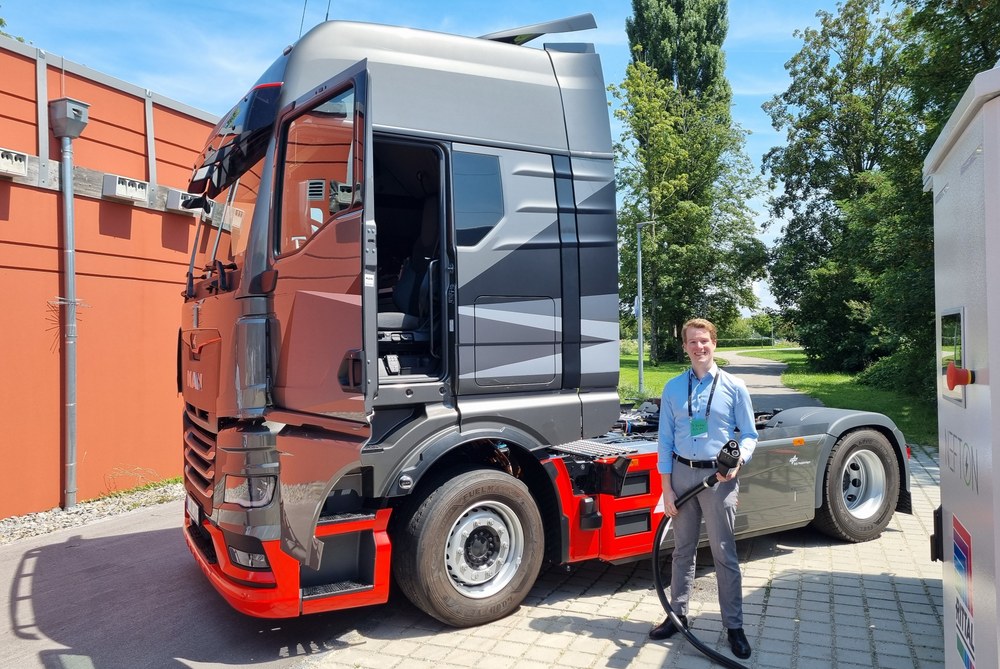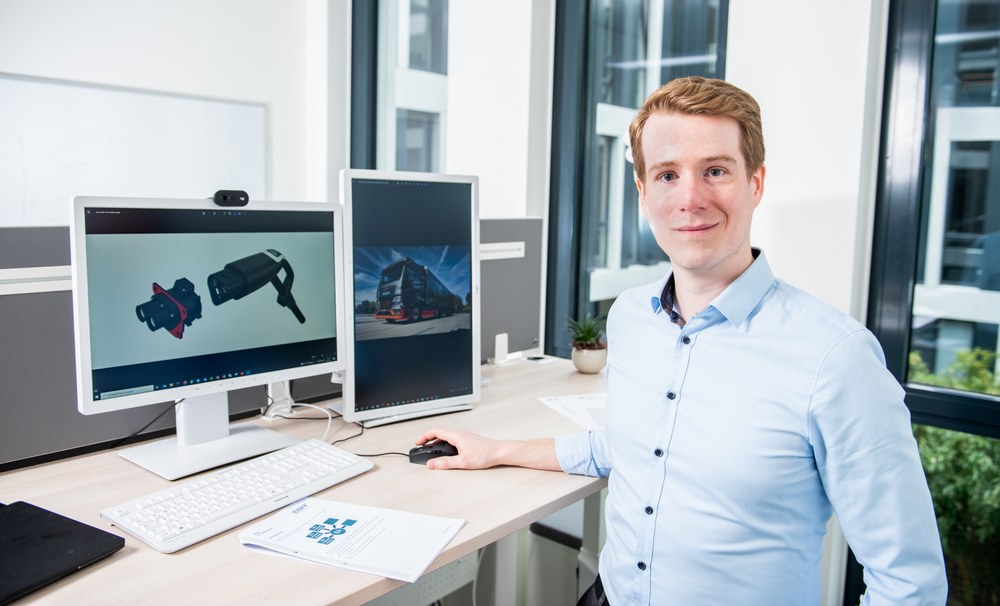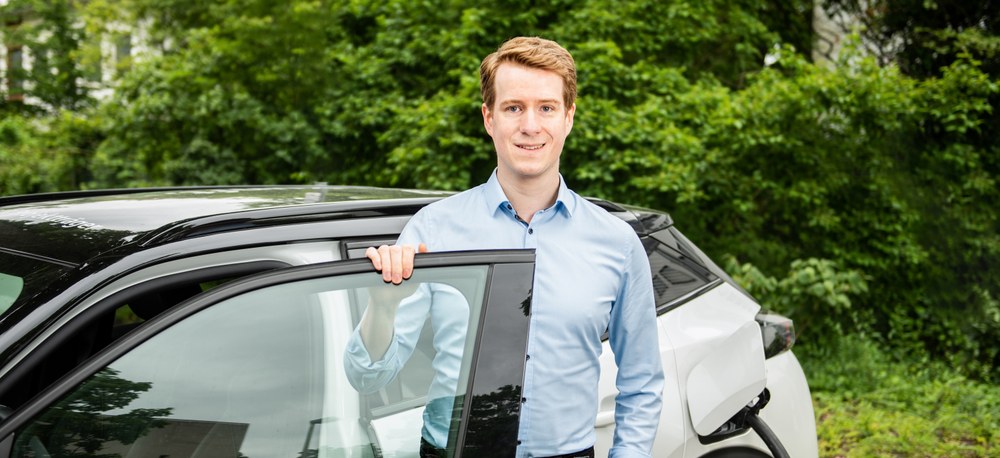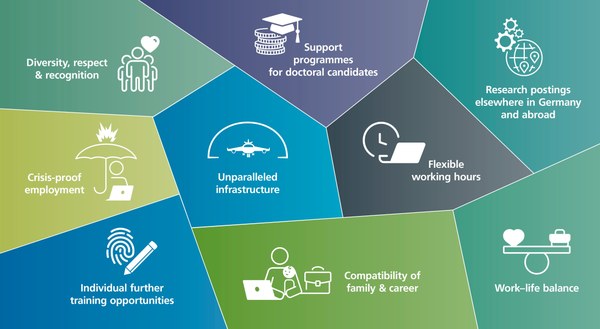Jens Erler
Field of study: Physics and astronomy
Now: DLR Projektträger – Society, Innovation, Technology
Jens Erler studied physics and astronomy in Bonn and holds a doctorate in astrophysics. He has been working as a Scientific Officer in the Society, Innovation, Technology department of the DLR Projektträger since 2020. In this interview, he explains what the Electromobility and New Drives department does.
Jens, what do you look forward to when coming to work in the morning?
Jens: (laughs) I am not a morning person; I am most active in the second half of the day. But I like to stay at work a little longer. I am therefore pleased that at the DLR Projektträger we can work flexibly within core working hours.
I also appreciate the dialogue with my colleagues, who are all working on exciting topics. Recently, I was able to support a neighbouring department with a call for funding for peace and conflict research in the natural sciences, where I worked on nuclear disarmament and arms control. I am often surprised by the variety of activities carried out at the DLR Projektträger.
What are you working on?
Jens: I promote research and innovation in electromobility. At the DLR Projektträger, we have co-designed the funding programme 'Elektro-Mobil' and are now implementing it on behalf of the German Federal Ministry for Economic Affairs and Climate Action (BMWK). We are working closely with the experts there to get electric trucks and bidirectional charging onto the roads before the end of this decade.
„My favourite practical example is the new MCS fast charging standard with high charging power for battery electric trucks. The very high battery capacities call for a large, triangular connector, which was implemented for the first time in one of our funding projects.“
For instance, projects that further develop charging infrastructures – in other words, charging stations and charging parks for electric vehicles – are being funded. There are important underlying questions behind this. How can electric vehicles be optimally integrated into the power grid and how can they not only reduce the burden on the power grid, but also support it? We also promote developments in vehicle engineering and production technologies. Examples of this include new, more efficient production processes for electric motors and battery cells.
My favourite practical example is the new fast charging standard called Megawatt Charging System (MCS) with high charging capacity for battery electric trucks. Due to the very high battery capacities, a large, triangular connector is required. This was implemented for the first time in one of our funded projects. In the future, it will be found in many battery-electric trucks. And I find it extremely exciting that this development could be significantly accelerated with the BMWK funding.

What does your typical working day involve?
Jens: It has a certain routine. We issue a funding call inviting universities and companies to jointly submit project proposals. During this phase, we read many project proposals and later process funding applications. During the project phase, we read and evaluate progress reports.
Project managers often contact me with questions about the funding, especially when it comes to possible adjustments to the project plan. Then I have to decide: Does this change make sense? Is it still in line with the goal? Of course, I also liaise closely with my colleagues in various meetings, particularly with the funding managers who are responsible for the administration and business management of our projects.
How is your work being used?
Jens: The results of my work are ultimately research projects that run as smoothly as possible and yield good findings and products. Firstly, because in collaboration with the BMWK, we have selected the most technically coherent projects – those that make the most sense in terms of funding policy and those that are particularly well organised in terms of planning. Secondly, because our project support is closely integrated and flexible.
Ultimately, our funding programmes motivate risk-averse companies to break new ground and develop something new. We support industry in really taking the logical step towards electromobility – in all vehicle categories. Battery-electric trucks in particular have to catch up on roughly ten years of development time compared to cars. But that's precisely why this sector is particularly exciting at the moment. My work is extremely rewarding because we are always trying to make things possible and actively help shape the future.

What are the highlights of your work?
Jens: The visits to the projects. I get to see the fantastic developments that the funding programmes are creating first-hand. I was recently on one of the large test tracks for catenary trucks, which can be supplied with electricity like a train via an overhead line. I was also impressed by a battery-powered truck in which an empty battery can be swapped for a charged one exceptionally quickly with the help of a robot. This is an example of a high-risk technology that would not have existed without the adequate funding. I am particularly enthusiastic about such versatile developments.
„My highlights are the visits to our projects. I get to see the fantastic developments that the funding programmes are creating first-hand.“
What special skills can you make good use of in your job?
Jens: As a physicist, I can understand problems quickly and recognise connections well. Even if you are not an expert in one area, we at the DLR Projektträger always make very good progress with our analytical thinking. My colleagues and I also have to keep track of a lot of things, even when the workload is high. With motivation and diligence, that works quite well.
My experience in university teaching has also helped me a lot – not only in familiarising myself with new colleagues, but also in temporarily taking over the leadership of a group. As I like explaining and guiding in a way that is appropriate for the target group, I applied for our management trainee programme. This will create a pool of talented managers who will be able to take over from senior colleagues when they retire. I have already had some great training courses as part of the programme and I am excited to see what happens with this personal development opportunity.
Leave us a final thought.
Jens: I really enjoyed researching and teaching astrophysics, but at some point I felt I was too far removed from the current problems facing humanity. I wanted to get personally involved in the fight against climate change. As a result, I looked around and found exactly the right position in the Electromobility and New Drives department at the DLR Projektträger.




